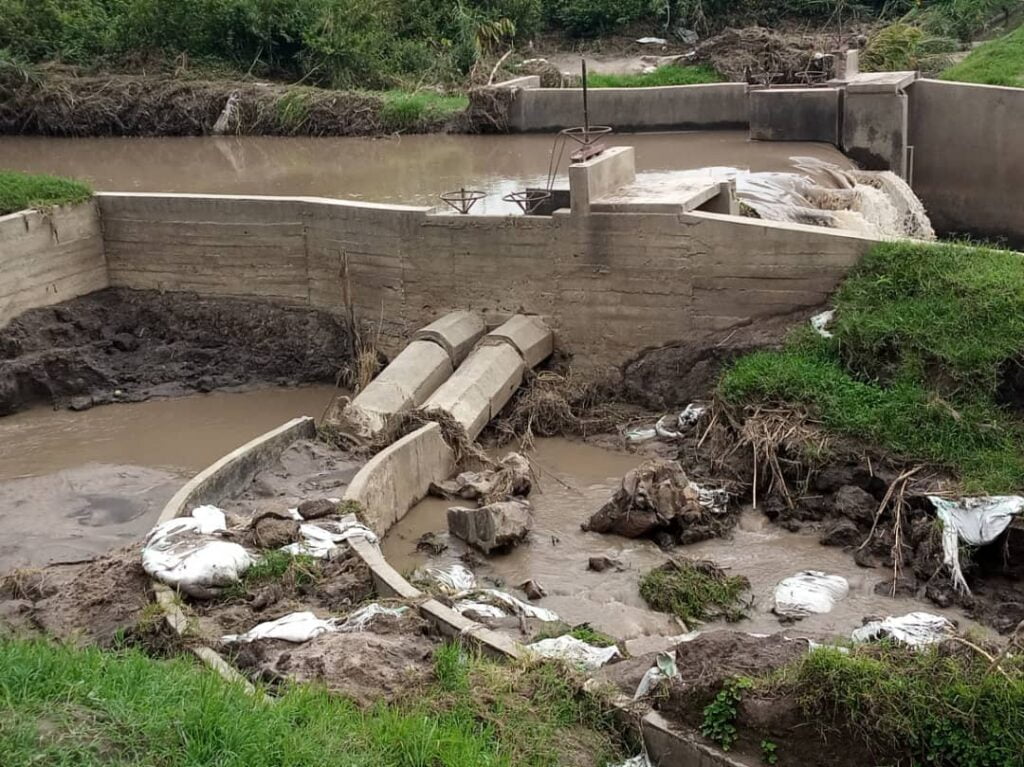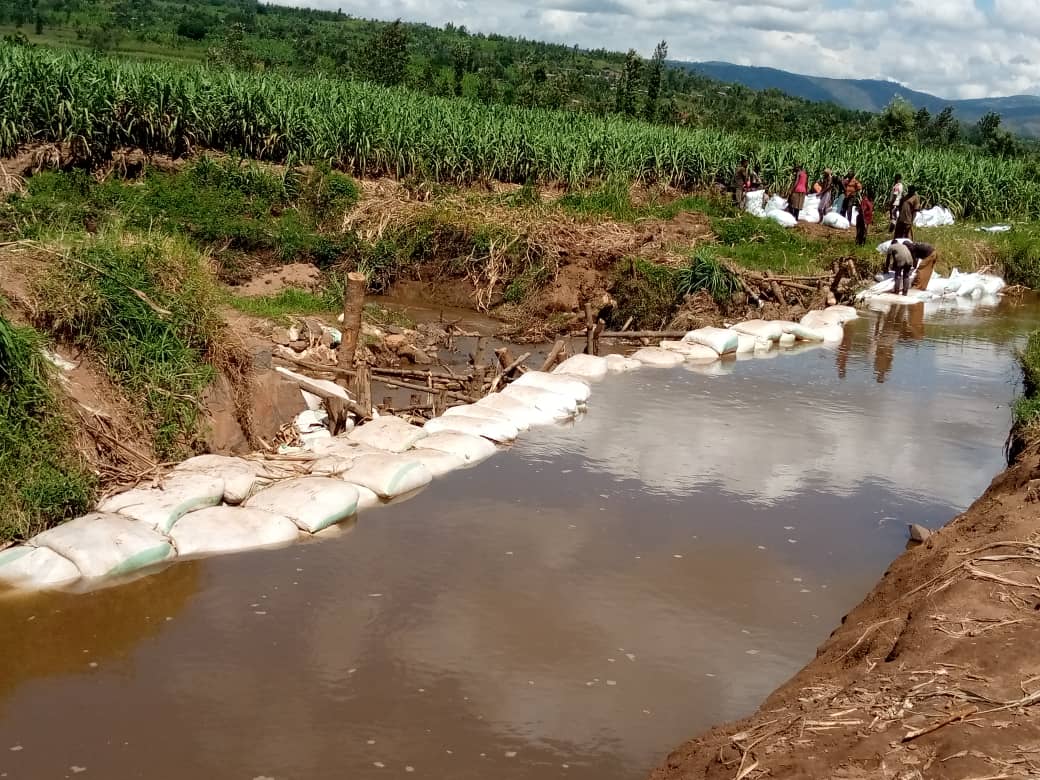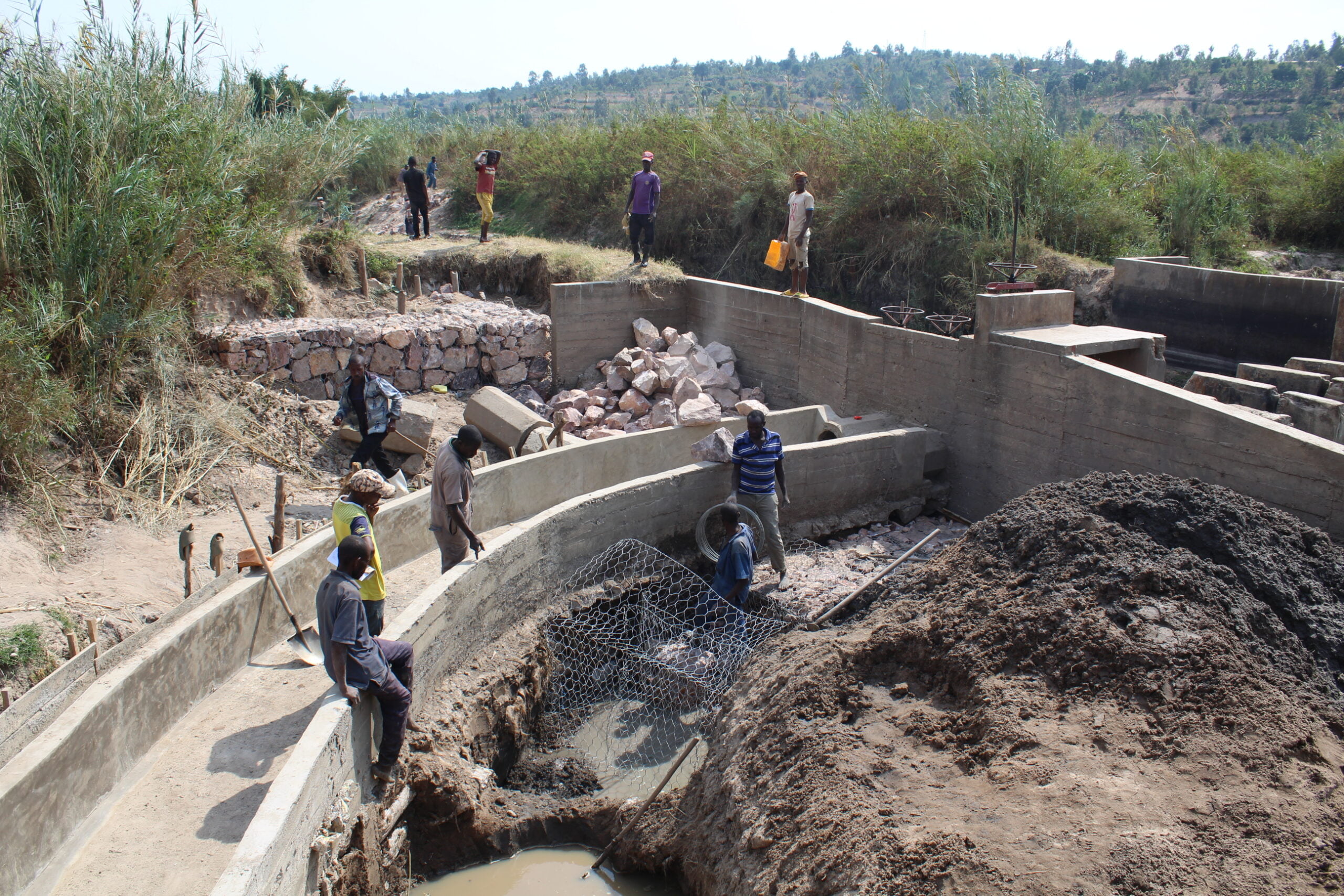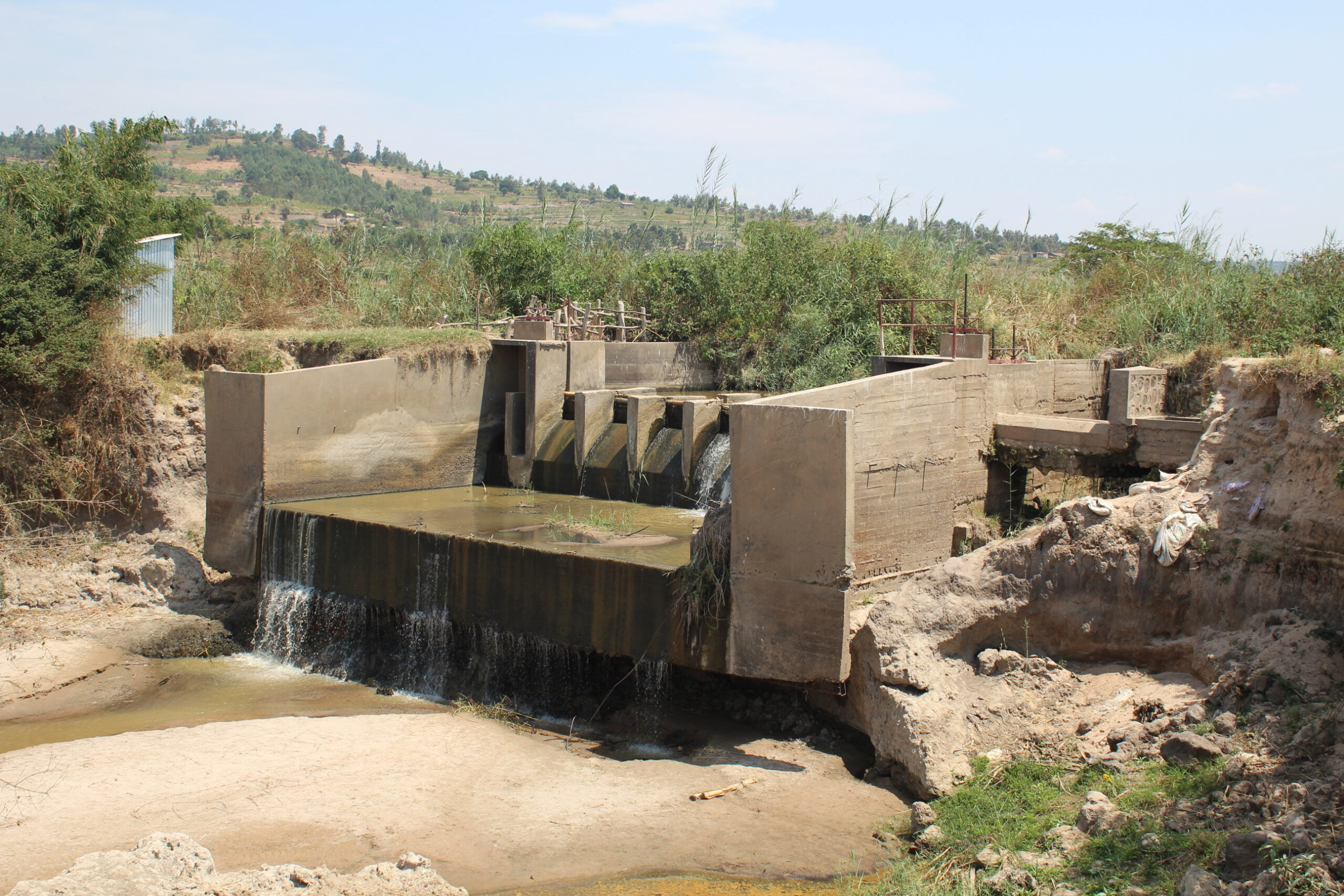Rwanda Irrigation Plan under Threat As Millions of Fund Go Missing

Water diversion weirs (No. 2) in Mukunguli marshland were destroyed by floods in May 2023 (Photo: Cooproriz-Abahuzabikorwa).
Celestin Ntamukunzi, a rice farmer from Cyabayaga marshland in Nyagatare district has seen his livelihood disappear before his eyes as floods washed away his fields, flooding which would have been avoided were millions of francs meant for maintenance not stolen.
The father of four narrates how their irrigation dam which was never rehabilitated for the last 35 years has become an enemy of more than 1000 farmers who are condemned to lose their production every farming season.
It was in 2021 planting season when particularly the worst happened to Ntamukunzi.
“I had planted my 60-acre farm when floods all the way from Northern Province hills washed away half of it. I am still suffering the loss,” said Ntamukunzi who had invested Rwf 500,000 in the farming and expected to earn at least Rwf 200,000 interest.
Instead, he saw even his capital taken away by the water that was caused by poor canalisation in Ngoma dam that feeds them from Umuvumba River.
“During rainy season, floods destroy a makeshift retaining wall that we place at Umuvumba river to channel water into our farms, and destroy our farms. During the dry season, the river dries up and we cannot have enough water for our farm,” Ntamukunzi said.

Ntamukunzi’s story of ups and downs in this farming which he started in 1997 is long, but he recalls that in several occasions, leaders of CO-DERVAM, his cooperative informed agricultural officials that they were forgotten and needed to see irrigation system work properly.
In 2005, they wrote to officials who made empty promises and in 2016, they contacted them and they made more commitments which never materialised. They renewed the call in 2019 and several other occasions, in vain.
“This week, agricultural officials visited us again and promised to work on it, but, owing to the background of this saga, we are reluctant to believe that they will walk the talk,” Ntamukunzi said.
Misappropriation of funds and poor delivery of projects is threatening to jeopardize Rwanda’s irrigation plan, which is a setback to the beneficiaries who used to be hopeful farmers.
The issue is not an exception of Cyabayaga in Eastern Province, but farmers from Mukunguli in Southern province narrate similar ordeals.
All was well until 2018, when farmers in Mukunguli rice farmers’ cooperative with 400 hectares in Kamonyi and Ruhango districts started seeing their irrigation canals being destroyed by heavy floods.
They run to the water users which are the associations that were proposed by Rwanda Agriculture and Animal Resources Development Board (RAB) to provide the water canals maintenance services in case the damages are not heavy.
However, the water users found the budget beyond their reach, and they went to appropriate channels that would save farmers.
The law provides that RAB, the government entity contracts firms for rehabilitation in events when damages are major.
Apparently, the tender process brings in room to corruption and the money benefit a few people who selfishly put them into their pockets, leaving the farmers miserable.
Embezzlement suspicion
Reading official reports, it is alleged that the government has paid the cost that is required to give the farmers required irrigation infrastructure that would allow them to expect harvest at any cost.
However, on May 2, 2023 the Auditor General of Public Treasures Kamuhire Alexis presented the 2022 report before the parliament, both chambers where RAB came on the limelight.
It was indicated that on January 31, 2020, RAB signed a framework contract for the supply and installation of irrigation infrastructure in different sites.
The contract provided for hiring excavation machine at a cost of Rwf 3. 8 million per day, but referring to the prevailing market prices, the Auditor General noted that it was unreasonably high price.
According to the auditor general, a market survey indicated that the cost of excavators ranges from Rwf 300,000 to Rwf 500,000 in Kigali and from Rwf 600,000 to 1,600,000 outside Kigali.
“When we considered an expense of Rwf 3.8 billion which RAB spent in excavation, we noted that the institution caused Rwf 1.4 billion loss to the public treasures,” Auditor Kamuhire said.
Farmers, the victims
The Auditor General further indicated to the parliament that some works in three marshlands of Mukunguli, Gashora, and Cyabayaga worth Rwf 360 million were not executed yet money was released to achieve them.
Mukunguli marshland in Kamonyi district, Southern Province consists of more than 400 hectares of rice that is grown by Cooproriz-Abahuzabikorwa cooperative. The cooperative has over 2,000 members.
It has four water diversion weirs that feed water to small canals to support farms’ irrigation across the blocks.
In our visit to Mukunguli marshland, August 7, Ndakengerwa Eugène, Manager of Mukunguli water users, said that the construction of their four water diversion weirs was completed in 2016, but they were destroyed by floods in 2018.
However, disaster caused by heavy rain didn’t stop after the rehabilitation and every now and then, it damages the weirs. Consequently, the cooperative struggles to raise maintenance fees.
“This year alone, we paid an estimate Rwf 10 million in repair but it is not sustainable,” he said adding that the farmers need government’s support but it is not coming.

In front of these challenges however, the Auditor General said that RAB is answerable.
“We realized that there is poor construction of weirs in Mukunguli, Kamiranzovu and Bugarama marshland. It is as a result of RAB’s lack of follow up of important projects,” said the Auditor General.
According to Ndakengerwa, currently, three water diversion weirs are in operation because the cooperative “managed to do the least to have them work.”
However, the fourth water diversion weir is not in use, because it was severely damaged.
“At the construction of these infrastructures, we realized some problems, but the RAB contractor fixed them. Today, when we see the failure of the last weir, there is a reason to believe that somehow, somewhere, the contractor got it wrong,” said Ndakengerwa.
Water diversion weirs (No. 3) in Mukunguli marshland await rehabilitation (Photo: Nadine Umuhoza)
According to the agronomist who follows up the water diversion weirs on a day to day basis, this issue of poorly or no functioning water facilities affects farmers negatively.
“They create stocks of sand which obstructs the water from proceeding into the canals to serve for irrigation,” he said adding that removing the sand itself has become another challenge.
“Local leaders are of a view that removing the sand would be destroying the environment, and thus, they suggest that we need to have a special permission from central government which we think is far-fetching,” he further said.
In front of these challenges, the rice farms themselves are being affected, and the beneficiaries are afraid, that it is the beginning of a sad episode in their farming.

According to the cooperative agronomist, an estimate 20 hectares does not receive enough water because of the fourth water facility which is not functioning.
“An estimate 20 hectares have already dried up. We are still counting to establish the exact number of affected hectares, but we fear that our production is at risk,” he said.
In front of these shortfalls however, there has been no legal action to establish the suspect and have them sent in a court of law to explain.
Part of recommendations the auditor General made during a plenary session at Rwanda Parliament, May 2, 2023, he suggested that RAB should return the money.
On a general note, the auditor general said that they managed to have some mismanaged funds returned to national coffers, and the process will continue.
“In previous years, we highlighted some Rwf 2.4 billion embezzled fund which were never recovered, but this year, some Rwf 178 million were returned, out of Rwf 2.2 billion that need to be recovered,” said Auditor General Kamuhire.
Meanwhile, the head of irrigation department at RAB Jerôme Hitayezu claims that they are working on a rehabilitation project.
“Our infrastructure inspector will conduct a visit to Mukunguli next month and advice on way forward. The marshland is among our priorities and could be rehabilitated within 2 months,” he said.
“We had some delays due to financial constraints and the study that was not yet complete but this time the process is promising.”
The National Strategy for Agricultural Transformation, phase 4 indicates that Rwanda targets to achieve irrigation from 48,508 hectares in 2018 to 102,284 hectares in 2024.
By 2022, according to Agricultural annual report, irrigation was achieved on 68,126 hectares, equivalent to 66.6 per cent of the target.
“This story was produced by Nadine UMUHOZA. It was written as part of Wealth of Nations, a media skills development programme run by the Thomson Reuters Foundation. More information at www.wealth-of-nations.org The content is the sole responsibility of the author and the publisher”.

